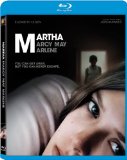| Reviews & Columns |
|
Reviews DVD TV on DVD Blu-ray 4K UHD International DVDs In Theaters Reviews by Studio Video Games Features Collector Series DVDs Easter Egg Database Interviews DVD Talk Radio Feature Articles Columns Anime Talk DVD Savant Horror DVDs The M.O.D. Squad Art House HD Talk Silent DVD
|
DVD Talk Forum |
|
|
| Resources |
|
DVD Price Search Customer Service #'s RCE Info Links |
|
Columns
|
|
|
Martha Marcy May Marlene

Please Note: The screen captures used here are taken from promotional materials provided by Fox Searchlight, not the Blu-ray edition under review.
Sean Durkin's Martha Marcy May Marlene is the kind of film that, in a better world, would be showered with Oscars and have the whole culture (not just the little patch of movie-reviewer land that, for example, yours truly lives in) abuzz with excitement over something so bold, so imaginative, so astute, and so well-realized shining like a beacon out of the tangled jungle that constitutes the landscape of contemporary American cinema. It will surprise no-one, however, that in the real world, this restrained, incredibly moving and disturbing psychological drama was cynically pushed out into the market with a shamefully misleading ad campaign that warped it from something unusual and unique into an utterly familiar creepy-thriller--a strategy sure to lead to disappointment for any moviegoer who just wanted to zone out with something they've already seen before. (It could even infuriate them--didn't anybody learn anything from the very good, much-despised The American, which was similarly misrepresented?) Fortunately, trivial elements like its marketing and snubbing by the Academy will soon be forgotten, leaving only a film so strong and memorable that it's bound to emerge in retrospect as one of the best debuts (and clearly among the better films in general) of its time.
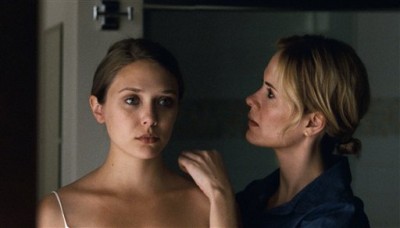
In the hands of lesser/more conventional storytellers than Durkin, the premise could have led to just the kind of thing the film was so lamely advertised as: a scary movie about a girl trying to outrun some creepy people from her past. The film is scary, but in a way much less immediate and fleeting (and much deeper and more affecting) than anything easily slotted into the "thriller" template. Elizabeth Olsen gives a remarkably perceptive, finely modulated performance as Martha, the young woman at the center of the story. As the film begins, Martha flees what appears to be some sort of commune in the middle of nowhere and is trailed by one of her fellow residents (Brady Corbet, Funny Games), who tracks her down in the local small town and browbeats her but, shying away from a public confrontation, fails to coax her back. From a Greyhound-station payphone, Martha calls her older sister, Lucy (Sarah Paulson, The Notorious Bettie Page), whom she has not spoken to in several years, to retrieve her, and she is brought to the lake house where Lucy and her husband, Ted (Hugh Dancy, Savage Grace), are staying while on vacation. The film's present takes place during the several weeks that Martha stays with Ted and Lucy at this luxurious, isolated location, with about half of the film made up of flashbacks that free-associate back to Martha's recent past and connect it in various ways to her sometimes very disconcerting present behavior (casually taking off all her clothes to swim in the public lake, nonchalantly entering Lucy and Ted's bedroom and perching herself on the edge of the bed while they're having sex, informing her sister that she is "a teacher and a leader" and her brother-in-law that he "learned to measure success by money and possessions.... It's just not the right way to live.") Martha's strangeness would be much more explicable to her sister and brother-in-law if she would let down her sometimes zombie-like, post-traumatic reticence and share with them anything but the vaguest hints regarding what we see of in flashback of the past couple of years of her life.
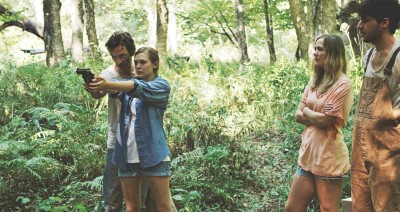
In those years, as we see the scenes play out in her memory during and in between the increasingly tense moments she passes with her newly-refound family, Martha has spent the time since she was last in touch with her sister on a little farm upstate with a group of other young men and women working to make their remote home self-sufficient, all of them under the sway of an extremely charismatic older gentleman called Patrick (John Hawkes, Me and You and Everyone We Know). These people are extremely welcoming, kind, and generous with newcomers; dietarily somewhat strict; gender-segregated; and regimented in their routine. Sexuality is played out among them following a strange code through which the members have orgiastic (but evidently rather joyless) relations with one another, all in the same room under the watchful eyes of Patrick, and each of the group's new female members takes a turn being drugged and placed alone in a room only to wake up to the sensitive-eyed, guitar-strumming leader's amorous attentions, in a sort of rite of initiation. It seemed at first to be the kind of family that the lost, lonely, alienated, and aimless Martha (whose only available blood relation was her sister after her parents died) was looking for; she could leave the burden of individuality and societal pressure about self-development and success behind to become a new person, just a blissed-out part of the cooperative, loving whole--the "Marcy May" that Patrick seductively claims to see in her in a ploy to separate her from her former identity. It was only after she found herself aiding in the drugged/coercive "initiation" of a new young woman and witness to an alarmingly sudden, Manson family-like act of violence that Martha felt the need to slip away in the early morning hours--the first event we witness and the moment that separates the film's before and after.
It's certainly not that this kind of staggered, vacillating approach to cinematic time has never been used before; Atom Egoyan's films, for one example, would not be at all what they are without it. But it is especially effective here, working very well not only as a builder of psychological suspense when it comes to our discovery of how Martha came to be the way she is and behave the way she does, but also as a barrier to any oversimplification of Good and Bad a film that depicts such troubling behavior and circumstances could fall into. Durkin is not so subtle as to present life on the farm as anything but deeply disturbing, manipulative mindlessness, but he takes pains to neither flatten out Patrick and the people who have given themselves over to him nor condescend to what would understandably appeal to Martha in their share-and-share-alike, anti-individualistic ethos. A principal effect of the film's paralleling Martha's present with her nice, bourgeois-bohemian-yuppie sister and brother-in-law to her recent exposure to a radical, pseudo-moralistic, "purity"-aspiring way of life is to give the impression that, although one is doubtless more reckless and morally dubious than the other, neither has very much to offer that could genuinely address the kinds of inchoate longings and questions about life that Martha has. In the end, as her behavior and refusal to tell them what has really happened to her becomes too much for Lucy and Ted, and the next step in her journey seems unlikely to get her any closer to what she's looking for, the only thing we can be certain of is that Maratha's past, however intent she is on ignoring or abandoning it, won't go away and seems certain to literally or figuratively catch up with her.
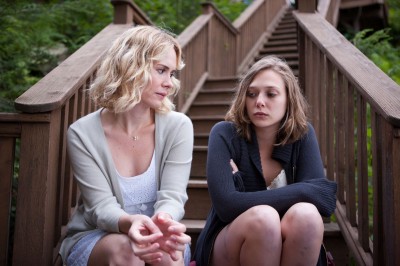
In a film that aspires to the ambitious level of subtlety, restraint, and depth that this one obviously does, the stylistic choices--the way space and sound and mise-en-scène are used, the lighting, the duration and movement of shots--become absolutely essential in creating its tone, feel, and perspective, and Durkin (along with cinematographer Jody Lee Lipes, whose work here is never showy but is always visually exquisite) is impressively attentive to those all-important visual and aural elements. Sonically, the film uses its elegantly simple score sparingly and creates an acute, ongoing awareness of the characters' environs by incorporating multiple, supple layers of well-recorded and -mixed sounds to reflect its environments (the lake, the farm, the forest, etc.). The use of shallow depth of field is absolutely perfect for capturing the feel, for Martha, of her place in and interactions with the world around her, and all of the film's interiors and exteriors have been chosen and/or designed to evoke a smooth ordinariness whose properties of shadow and light are just heightened enough to convey the alienation and anxiety lurking there. Like Bergman or Kubrick, Durkin has a uniquely well-trained eye for the truly photographic representation of reality, and the film is possessed of a well-composed sort of realism that finds and reveals both the beauty and trouble in its seemingly everyday settings and locales, whether it's Lucy and Ted's rented lake house, the Greyhound bus stop, or a benevolent and pretty-looking farm on a little patch of pastoral land enclosed by a thick forest.
There is a bounty of talent on display in Martha Marcy May Marlene, all of which brings a refreshing seriousness to both the story being told and the manner of telling it. The film conspicuously lacks any of the disabling self-consciousness or need to be hip/cool that can too easily be the telltale sign that what you're watching is a first feature-length film; Durkin has no need or time for any superimposed editing/technical trickery, uncalled-for elaborateness of style, or anything that would distract from his clear, confident aesthetic and narrative visions. Going by what Martha Marcy May Marlene tells us about the rigorously intelligent, (com)passionate creative sensibility he's capable of bringing to every stage of the process, it can be said unreservedly that he is a major new filmmaking talent. In fact, based on the fineness of the work from everyone involved (and all that praise you've heard for star Elizabeth Olsen is 100% warranted), one expects great things in the future from everyone involved in this unique, audacious stunner of a movie.
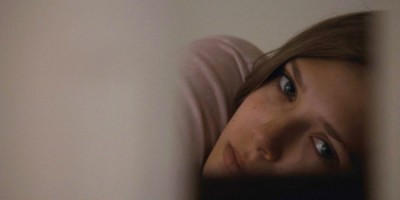
THE BLU-RAY DISC:
This AVC/MPEG-4, 1080/24p, 2.40:1 aspect-ratio transfer of the film gives us Jody Lee Lipes's brilliantly understated, naturalistic cinematography in all its glory. A nice celluloid texture is preserved, and there is not even a microsecond of aliasing, edge enhancement, noise, or any other compression artifacts; skin tones look solid and natural, darks have no fuzz at all, and all of the colors are vivid and well-differentiated.
Sound:The disc's DTS-HD Master Audio soundtrack is wonderful; in a quieter-than-usual movie, it really lets you appreciate all the nuances in the different layers of sound, from dialogue to ambient noise to Daniel Bensi and Saunder Jurrian's deep, rich, dark, strings-driven score. It's all brilliantly, vibrantly clear, with no spots of distortion or imbalance whatsoever.
Extras:--The most interesting extra by far is Durkin's 20-minute 2009 short, Mary Last Seen, which he made while in preproduction for Martha Marcy May Marlene. It deals with the same themes as the later full-length film (and even has Brady Corbet in the creepy-follower role he would reprise), but it's both more elliptical and ambiguous and more bluntly thriller-ish than that, with the bulk of the film involving the quasi-kidnapping by Corbet of a young woman (Stefanie Estes) he's luring to the same new "family" on the same utopian-communal farm that appears in Martha Marcy. It's a visually gorgeous (shot on crisp, beautifully color-corrected DV by Drew Innes), well-written, confidently directed, and overall quite accomplished warm-up exercise, a trial run that shows a creative approach in the process of evolving, almost but not quite there. Durkin and co. would slightly re-proportion and perfect the elements of suspense, drama, and visual poetry when they got down to making Durkin's excellent debut feature.
--There otherwise appears to be a large-ish handful of extras, but things with titles like "A Conversation with the Filmmakers" or "Spotlight on Elizabeth Olson" are just three or four-minute mini-featurettes put together by Fox Searchlight as promotional materials. They do actually offer you some choice tidbits of Durkin and his co-producers talking about the making of the film, as well as some insights into its development and creation, but these are all truncated and boiled down into over-edited, trailer-like segments that become repetitive. There's also a clip of John Hawkes in the studio recording the menacingly seductive version of "Marcy's Song" that his character sings in the film.
FINAL THOUGHTS:Martha Marcy May Marlene marks the auspicious beginning of what anyone who appreciates a well-considered, psychologically/emotionally and visually/tonally well-executed picture will hope is a very long and very prolific career for writer/director Sean Durkin. In giving us the story of a young woman trying to recover from the gradually but persistently more bizarre couple of years she spent with the cultish "family" she fell in with and was barely able (if she is ultimately able at all) to pull herself away from, Durkin creates psychologically/emotionally fascinating, resonant characters, situations, and interactions, and makes some incredibly subtle and incisive observations about the ever-problematic human needs for family and community, and the ways in which different attempts to fulfill those needs can fail or harm, whether apparently "normal" or obviously not. It is a stunningly empathetic (but never sentimental), smart (but never condescending), visually breathtaking and ambitious (but never slick) film that could have come from a filmmaker twice Durkin's relatively young age. If an excellent, thoughtful, pitch-perfect movie like Martha Marcy May Marlene is always a reason to feel encouraged and optimistic about the state of the art, that it has come from an artist with this many years (and, hopefully, a great many films) ahead of him makes it that much more so. Highly Recommended.
|
| Popular Reviews |
| Sponsored Links |
|
|
| Sponsored Links |
|
|
| Release List | Reviews | Shop | Newsletter | Forum | DVD Giveaways | Blu-Ray | Advertise |
|
Copyright 2024 DVDTalk.com All Rights Reserved. Legal Info, Privacy Policy, Terms of Use,
Manage Preferences,
Your Privacy Choices | |||||||









